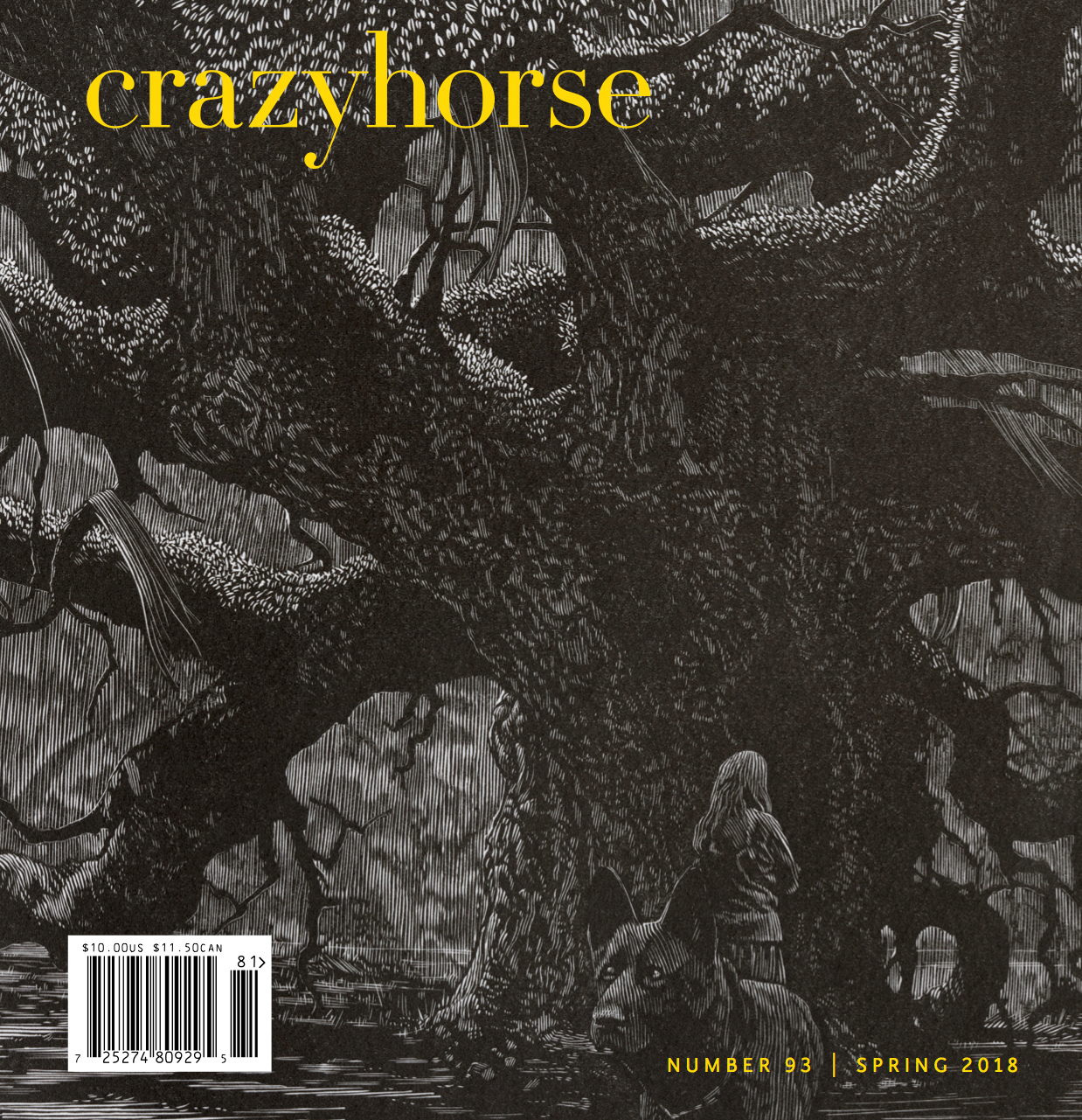
Mathilde Walter Clark has written five books and starred in a Danish-language television show of her own creation. Her story, “The Disappearance of Things,” appeared in translation in The Chattahoochee Review.
Mathilde Walter Clark is the Danish-American author of three novels and two story collections. Her most recent book, Patron Wanted, is a work that doesn’t fit neatly into any literary category. The project started with Clark writing letters to rich men whom she thought might fund her writing—who would, essentially, play the role of patron of the artist. Every single person turned her down, and she turned their responses into a kind of literary performance art. Clark eventually won a grant from the National Arts Foundation, and the book was self-published with a foreword from a former Danish Minister of Culture and an afterword by yet another Danish Minister of Culture. Clark has also written the screenplay for and starred in the Danish-language television show, In Seven Minds. Clark lives in Copenhagen.
In this interview, Clark discusses crafting stories around a flaw in logic, her revision strategy (she sometimes doesn’t), and the challenge of translation when only six million people speak your language.
To read Clark’s story, “The Disappearance of Things,” and an exercise on writing plot, click here.
Michael Noll
One of the things I love about this story is that it’s entirely about the character’s mental state. Until the end, almost nothing really takes place. Instead, the focus of the story is on a consciousness in transition, and all of the paragraphs and the details in them are aimed at illustrating that transition from “orderly surroundings make an orderly mind” to the disintegration of both surroundings and mind. In a way, this is a conception of “story” that is different from how we often define the word, with its emphasis on plot and occurrence. Is this a coincidence–in other words, is this simply the way the story arrived on the page–or is it a purposeful choice on your part? Are you trying to write a different kind of story?
Mathilde Walter Clark
First of all: Thank you for asking me to answer these excellent questions and to be part of this great site. This is actually the first story I ever wrote, so I didn’t have much clue what I was doing. What got me started was a very real annoyance over how things sometime disappear, and it occurred to me that this annoyance comes from a belief that things don’t really disappear – they are somewhere, you just can’t find them. But what if they did in fact disappear, go on to non-existence from one moment to the next? It then becomes a matter of acceptance, a mental state. The character in the story is (like most of us) bound up in the logic of classical physics, but perhaps even more so. And so, to make the point of that stuckness, I imagined him a traditionalist, somebody working in a ministry as a public servant, an archiver of sorts, a ring-binder manager.
Michael Noll
The amount of detail in this fairly short story is staggering. For instance, there is an entire paragraph about the type of paper the character prefers. Again, this seems like a different conception of the role of detail. Very often as writers, we try to invent one detail that illustrates some quality of a character, and then we push that quality into a conflict: thus, plot is born. But in this story, you don’t seem satisfied with a few well-chosen details. This emphasis on exploring an exhaustive quantity of details reminds me in a way of the work of David Foster Wallace. He once wrote about his style, “The most obvious, ubiquitous, important realities are often the ones that are the hardest to see and talk about.” Is this something that you’re aiming for in your fiction? Trying to make the reader see obvious realities in a new light?
Mathilde Walter Clark
Absolutely. It is a trick I use in many of my stories: a world we know, but there is a missing piece somehow, or some logic or law of nature gone awry. Perhaps these disorders of things are what makes us see our world in a clearer light. This story has only one motor. You quickly get the drift: at some point all his stuff will be gone (some of my later stories have other story threads that complicate matters). As I wrote the story it very much became a story of lists and categories that was intended to reveal something about how we – or the character – make sense of the world. A matter of detailing as revelation.
Michael Noll
My favorite moment in the story is when the disappearances escalate from minor things like shoes to large items like a grandfather clock and then, very quickly, to people: his wife. How did you know when to make that escalation? Did you initially write many more mid-level disappearances (more large items like grandfather clocks), or was the escalation always that fast—shoes to wife?
Mathilde Walter Clark
Yes, it always went shoes to wife like that. No mid-level stuff. I thought of it as a reversal of the familiar scheme: a husband pops out to buy cigarettes never to return. In this case the wife disappears as he is out to get tobacco for his pipe. The suddenness of this disappearance. She’s gone, just like that, in one word. It also reveals something about the character, that his wife figures on his detailed lists of belongings alongside – one must suppose – less animated items.
Michael Noll
Nothing about the story should be funny–a man is growing old, losing his sense of self and the things and people around him. But it does have moments of sharp humor. After we learn about the disappearance of his wife, for instance, the very next sentence is this: “Yet it was the shoes that tormented him the most.” He also makes lists of everything that he owns, and then the lists disappear. This is kind of a dark humor, of course, but it’s definitely not the somber tone that one might expect given a story about someone in this situation. Was that humor always present in the story? Or did it arrive through revision?
Mathilde Walter Clark
I didn’t do any revision of this story. I wrote the beginning, and then nothing for a year or so. As I started writing some of the other stories for my first collection Disorder of Things, I finished it. The change of mental state, stretching that to absurdity, until finally the point where he accepts the loss and another state of mind takes over: now he wants to get rid of the last of his pitiful belongings. I saw something almost zen-like in this acceptance and riddance, that maybe, somehow, there is a strange sort of happiness, or at least calmness, involved in that loss. Many of the other stories in that collection center around the themes of language, matter, madness, loss, the possibility of serenity. How dependent we are on language to make sense of things, and what happens to our minds when language somehow fails? To me, the dark humor is inherent in these subjects, not something I can edit forth.
Michael Noll

Mathilde Walter Clark recently published, “Report From the Flatlands of Statistics,” an essay in the Los Angeles Review of Books on guns and the differences in “gun culture” between Denmark and Texas.
A question about translation: Americans have been justly criticized for not reading much work in translation, and American authors themselves have been criticized for not translating other writers into English. But the opposite is very common: American works are translated into dozens of languages. I’m curious how this particular translation came about. Did the translator, Martin Aitken, contact you? Or did The Chattahoochee Review discover your story in its original Danish and find a translator for it?
Mathilde Walter Clark
Translation is a catch 22. Especially into English – the most exclusive market in the world, and also the most attractive. As the translator is initially paid quite a lot more than the author, it’s too big an investment for the home country’s publisher to have the manuscript translated for the sole purpose of trying to sell it to other markets. But how can foreign publishers judge a manuscript they can’t read? Well, in this case only numbers speak. Most of what gets sold to publication in foreign territory – especially America – are books with impressive sales. Besides bestsellers, Hans Christian Andersen, Kafka and other deceased writers from the literary canon account for most of the meager 2% of foreign literature that finds its way into the US market. That, unfortunately, leaves out a lot of the interesting contemporary literature. As a writer in a language with only six million speakers, it is hard not to feel a little locked up. So for foreign language writers, translators rule. It’s thanks to their interests and passions that literature finds its way into other languages. I’m lucky enough to have had a little more than a handful of my stories translated and published in various American journals. This particular story was translated some years back by one of our best translators, Martin Aitken out of his good heart. He also made the connection with Lydia Ship, the editor on The Chattahoochee Review, and I am extremely grateful for the work he has done.
July 2014
Michael Noll is the Editor of Read to Write Stories.





Leave a comment